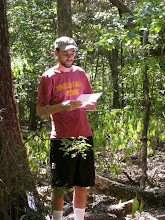All of a sudden, it hit me like a 300 ton boulder - these phrases and words I always think of are haiku. The brief images that flash through our minds before we move onto something else - these are haiku. It makes me reassess my pre-conceived notions about the craft. In its essence, haiku represents the bare bones of language, the minimum amount of diction needed to make something beautiful and meaningful. In that way, haiku could be considered the root of all poetry...I don't necessarily mean from a historical sense but more from an imagistic, poetic sense. I think that analysis holds some serious weight.
I used to dislike Haiku. In the past, the 5-7-5 pattern and obligatory proposition of revelation through nature bothered me. It seemed too simple and not important enough. I thought people who wrote haiku were lazy and didn't appreciate the full-fledged lyricism I assumed to be superior, both linguistically and artistically. I was so wrong, and I know that now. While I don't think I'll consistently try to write haiku, I will now be able to turn to it when I feel overwhelmed by the complexity of contemporary language.
I find it interesting that my discovery of the beauty and inventiveness of haiku coincides with my development as a person. As I discover more about the benefits of a Zen way of life, I become more aware of simplicity and leaving the desire for epic, over-dramatic pieces of fluff at the door. My lines of poetry are becoming shorter and more concise, which parallels my thought-processes and respect and admiration for what's always been in front of me. Creation is an extension of what is right in front of our senses.
Here is a BEAUTIFUL haiku from Arakida Moritake (1473-1549). He was a Japanese poet and a Shintoist.
Each word in this poem compels the reader to think simply but deeply. Although that sounds like a contradiction, I don't think it is. There is SO MUCH going on in this poem. We should not search for any answers in Moritake's bare language, but we should consider the scene he presents, if only to see the beauty in it. Think about the connection between each of the three lines, between the flower, the branch and the butterfly. Man, I could go on and on about this, but I'll let you, the faithful poetry enthusiast, take it from here.

Glad you are developing an appreciation for the haiku form. I've always liked it, maybe because it was one of the first that I learned and it didn't feel overwhelming. I like its simplicity - it's like an observation in a meditative swoop - Basho is one of my favorite haiku poets. Here's an interesting one (not by Basho): A rose one hand gives/another receives thus ten/fingers point to the same heart
ReplyDeleteI don't think it really conserves the original form other than the syllable count, but it's a nice image. Written by a teacher who taught me a lot about poetry years ago.
Yea, that's really good. I don't think it's really a necessity to rely on the syllable count unless you happen to be a hardcore haiku lover...but I think it's just a great way to see what simplicity in writing can do. I think a lot of poets I read on journals on the internet these days could learn something from haiku. I'm definitely learning something from haiku. A poem like the one you posted says so much about...well, everything, and all it took was 20 syllables. Wonderful.
ReplyDelete